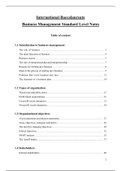Summary
Summary IB Business and Management SL Notes (UNIT 1 full notes)
- Course
- Institution
- Book
Useful and summarized notes for IB Business and Management SL. The notes contain important information based on IB experience that will help to gain an excellent grade. The easy way you can prepare for your exams.
[Show more]




